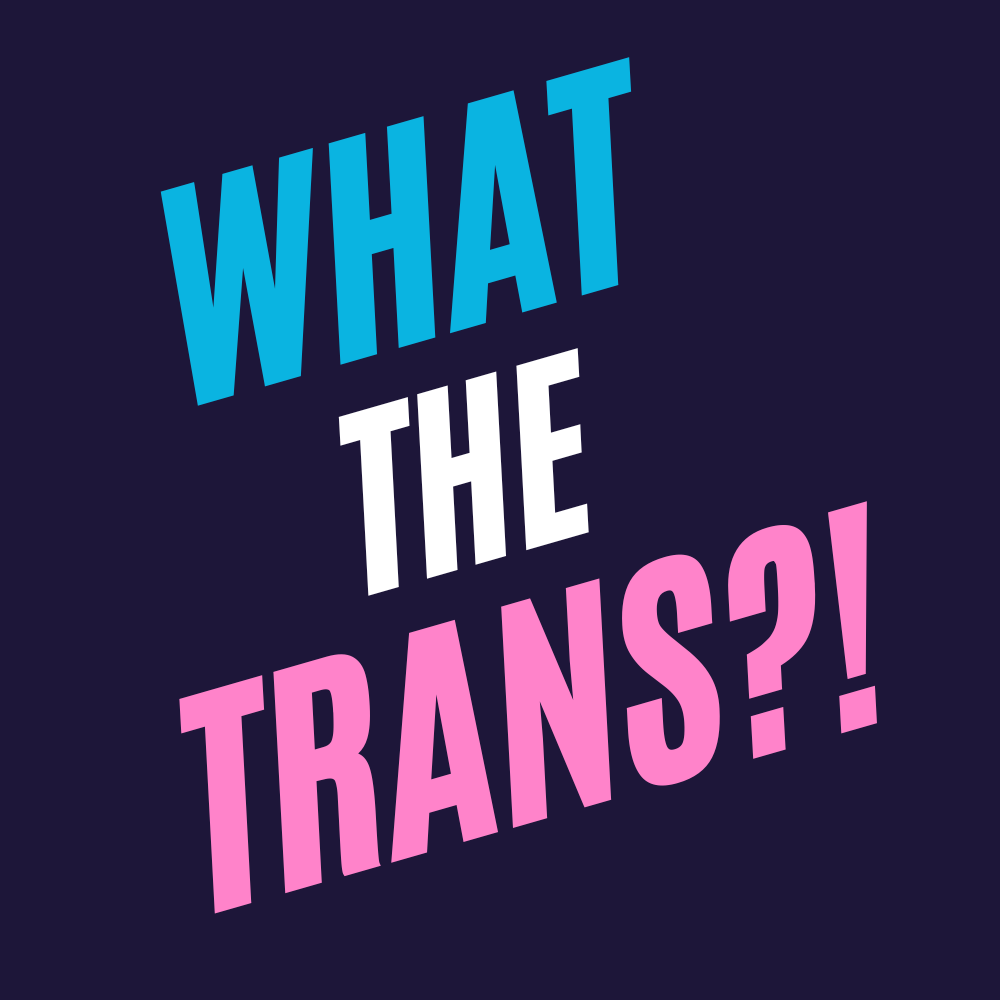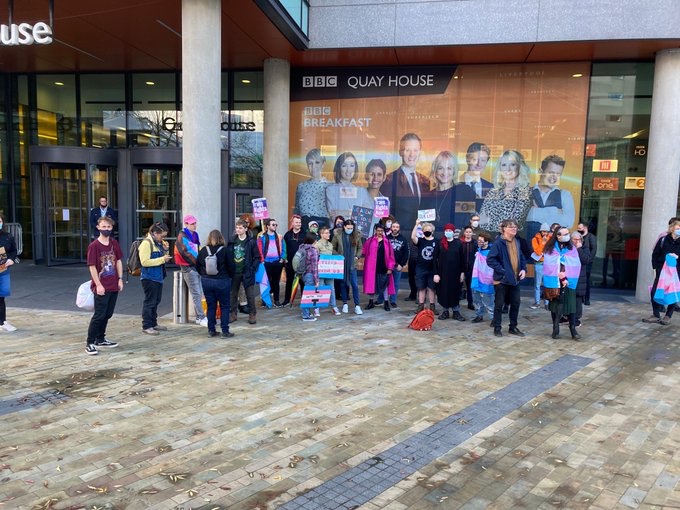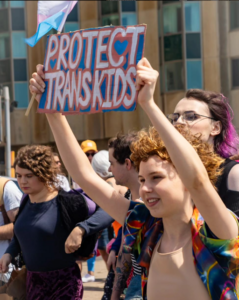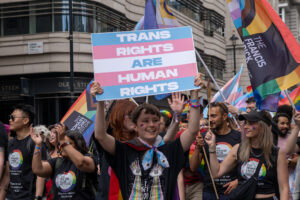The trans community has been very busy these past few weeks. On the 26th of October BBC News published a now infamous article titled ‘We’re being pressured into sex by some trans women’ and trans people and our allies have been responding ever since.
The headline was justified by an online poll that was put out into the world by anti-trans hate group ‘Get The L Out’ that was responded to by 80 cisgender women. Just over half reported that they felt they had been pressured into sex with a trans woman…but there are signs that their definition of ‘pressured’ may be very different when compared to others.
The article also gained attention due to its inclusion of former pornography performer Lily Cade who has previously been accused of sexual assault and rape by several women which Cade later admitted to. She then went on to publish an absurdly transphobic screed on her website’s blog where she argued that transgender women should be killed whilst naming specific trans women she wanted to see dead. She also included a call to rape the parent of a transgender teenager.
Cade’s contribution to the article has since been removed and BBC News added a section at the bottom of the article stating that Cade’s ‘inappropriate behaviour…should have been included in the original article.”
Sure.
The response from the transgender community to all of this has been immense. Trans Safety Network, a hate monitoring research group who focus on transphobia, announced on their website that ‘The BBC has failed trans people’ and went on to point out all the flaws in the original report . They also released a list of demands of the BBC including the full retraction of the article and an apology. You can read their full report on the article here.
Transgender Action Block, organisers of the LGB Alliance conference protest, also condemned the BBC. In a statement released online they said: “We do not believe fascists who call for genocide should be platformed by the BBC; even Speaker’s Corner would be too much really.” You can read their full statement here.
Trans activism UK, a group who have organised several high profile protests against governmental transphobia, created an open letter that very quickly gained 20,000 signatures that went on to be reported by NBC, Newsweek, PinkNews and many others. After Cade’s contribution to the article was removed Trans Activism UK released a statement saying:
“By choosing to remove all mention of Lily Cade, rather than contextualise her as a cisgender lesbian accused of the same crimes levied in the piece against trans women, the BBC is again choosing to bury the rebuttal argument that anyone from any background can be an abuser, and that to paint this as a trans woman specific issue is painting a minority group with a single brush stroke.”
You can read the full statement here and read the finalised version of their open letter to the BBC here.
The trans community and its allies have also organised several protests outside BBC regional headquarters and studios. Last weekend (30/10/21) three protests took place in Cardiff, Bristol and Manchester. As I can only be in one place at once (much to my immense frustration) I chose to attend the demonstration in Manchester.

Roughly 120 trans people and allies were in attendance. In what appears to be something of a trend, the police presence was relatively light. I only counted three uniformed officers who mostly chose to stay away. This protest centred on speeches given by a great many attendees (including myself, which wasn’t the plan but WHATEVER DON’T JUDGE ME).
Hollyoak’s Annie Wallace told the crowd: “What we are, are a bunch of individuals who are sick and tired of being pressured, bullied, one of the most marginalised and victimised communities on the planet.”
“…we thought we were making progress up to a certain point 6 years ago, until this backlash.”

Talking to protesters, there was a palpable sense of betrayal. One journalism student I talked to noted that the BBC used to hold a special place in their heart as they were taught that the BBC Current Affairs department was the gold standard in journalism. They told me they no longer believed that. This was a sentiment I kept hearing throughout the protest.
The speakers did not just talk about the BBC News article, the subjects were diverse (it turns out trans people have a lot to complain about). Topics touched on included the platforming of the LGB Alliance by the UK media, issues accessing gender affirming healthcare and the rise in transphobic hate crimes over the last five years. But there was just as many speakers expressing messages of positivity and hope including this from one trans woman of colour who stepped up to the megaphone:
“Being a trans woman and being a trans woman of colour, when I see stuff like this, it really makes me angry and it really makes me want to stand up because the more visible we are, the more we are prone to this kind of horrendous behaviour, and it just won’t stand and we need to remember that together, collectively, and im not just talking about trans people I am talking about trans allies as well, together we are unstoppable. And I want everyone to know that when I look out at all of you I see nothing but beauty, I see nothing but strength, I see nothing but courage. And that is what they are all afraid of, so they will keep back but we are going to pushback even harder.”
The protest outside BBC’s Broadcasting House in London (06/11/21) held very similar sentiments. Again, several protesters told me they felt betrayed by BBC News whose transphobic sentiments have only become more and more prominent over the past 18 months.

I counted roughly 80-90 protesters in attendance. Many told me this was their first protest but they felt that now was the time to start ‘getting involved’. The clear escalation in transphobic rhetoric (as well as the many, many revelations of shoddy journalism that have since emerged) has clearly lit a fire under many in our community.

Natacha Kennedy, an academic at London’s Goldsmiths University told me: “I came here because I’m so totally outraged by the way (the BBC) have done all of this, it’s not news, it is propaganda, it’s hate propaganda. Particularly because they are beaming it at Brazil which is where the largest number of trans murders take place every year consistently.”
“But I also think, and I am really passionate about this, the media needs to platform more trans people. This sort of stuff would be pulled apart by any half decent trans journalist.”
This trans journalist agrees.
A non-binary protester, who chose to remain anonymous, told me about how the BBC has form when it comes to platforming transphobia:
“I’m here because I am pretty old in non-binary terms and the BBC is even older than me and I remember the kind of start of the moral panic around trans issues and I remember standing outside the BBC then in 2007 and protesting the fact that they’d given a show to Julie Bindel to talk about her views on…”sex change surgery” and I thought that this was a ridiculous lapse and they are still doing it…I’m sorry to be back here.”
At the time of writing, the BBC has yet to take any further action in regards to the article but it is safe to say that the transgender community are not done yet. Another protest has been scheduled outside BBC’s headquarters in Brighton next Saturday (and I will write up the details of that protest very soon) but if you only take one thing away from this, let it be the fact for many trans people this was very much a ‘final straw’ moment and the BBC are going to be hearing a hell of a lot more from trans people over the coming weeks.






